Brienne Daugherty's Blog
September 22, 2024
“America Doesn’t Ban Books!”
Happy Banned Books Week! If you’re anything like the many dudebros I recently found in my TikTok comment section you’re already rolling your eyes and preparing a response about how America doesn’t actually ban books. I can practically smell the axe body spray wafting through my phone. This is all because one of my recent TikToks went a wee bit viral.
To give you an idea – a good TikTok view day for me is 1,000 with most of my content garnering a couple hundred views at best. I’m not made for content creation. So when the eight second video I shot at my local library earned 81,000 views I was, needless to say, stunned. What could I have possibly accomplished in eight seconds that led to that kind of response? It’s pretty simple – I shared that my local library was giving out free copies of Animal Farm by George Orwell for Banned Books Week. (They gave them out early so folks could come back to the library after reading them and have a book discussion. Isn’t that great?!) That’s it.

What followed was a wild barrage of everything: folks like me who loved the idea, in depth discussions of capitalism versus communism even conspiracy theories about the CIA. Cutting through all that, however, were a bunch of comments about how this book is freely and widely available, or required reading in school, so is OBVIOUSLY not banned.
Listen, I know that most of the folks repeating this are pretending to not understand what the term banned books means. Likely because they share political values with the type of folks who are marching into school board meetings making challenges. I’m not likely to change those minds but I what I can do is correct the misinformation, so here we go!
No, America does not make a habit of banning books from the public. We are a democracy after all and with freedom comes the right to read what you like! (For now – vote Harris/Walz in November.) The term “banned books” is one of those unfortunate colloquial phrases that had great intentions but can easily be purposely misunderstood, like “Defund the Police.” Banned books are really books that have been previously challenged and banned in some places. We can agree though, that phrasing isn’t nearly as sexy right?
Imagine this: you’re a person with a very particular point of view that’s drenched in racism, sexism, homophobia, adherence to capitalism or religious ideals you feel everyone must share. What better way to attempt to stamp out opposing viewpoints than to halt the reading about such ideas? What are you going to do though? Write a letter to congress asking them to officially ban a book from the American public? Of course not. We already said, America does not ban books.
That’s why most of these challenges begin in school districts at the local level. Sometimes one person notices a certain title that their kid brings home from the school library and shows up at next month’s school board meeting to raise hell. It’s not enough for them to tell their child they can’t read it. They need to be sure that no one else’s kids have the option of reading it either! A lot of the original challenges to books started this way.
It’s different now. Challenging books has become an organized, insidious practice taken on by groups and religious organizations. With tools like the internet at their disposal these groups research books published in categories they dislike and create lists of titles they plan to challenge. They distribute these lists to their censorship warriors who then march off to local schools and libraries hunting for books they don’t even know are there. Have they read them? Usually not.
And they will make up all manner of nonsense about a book to keep it from being read. A book featuring two gay dads is often described as “too sexual” for kids to read when there is nothing sexual about it. Why make up a lie? Why describe a book as inappropriate when it’s clearly not? Think bigger. How does one effectively ban a population from reading a book if they can’t “ban” it? If enough of these books are challenged in enough school districts across the United States preventing them from being read during the time of life when a child might have picked up that book then the book, and more importantly its ideas, have effectively been banned.
Banned Books Week is a celebration of those books that have been challenged, and often banned, in schools, libraries and other places at one time or another. To those dudebros in my comments sharing about these being required reading when they were in school, why do you think that is? Because as a nation we recognize the importance of sharing ideas that people fear. Why celebrate them? Or, and this question really speaks to the Aries in me (IYKYK), why make it a point to read them?
Because they don’t want you to.
Challenges to books increased 65% in 2023. To learn more about banned books check out http://www.ala.org/bbooks.
InstagramTikTokFacebookAugust 30, 2024
Book Review: The Groomer by Jon Athan
So this book has kind of built itself a reputation as a rite of passage among the Splatter Punk reader community. I don’t see it typically recommended to normies and that’s understandable. Based on the title and synopsis alone one could assume it would be difficult to stomach the traditional level of gore/gross when it’s directed at kids. This isn’t quite the case with The Groomer.
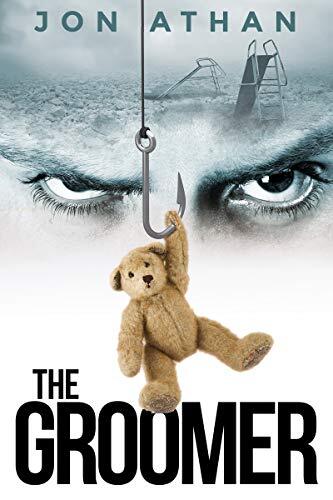
This is a book written by someone who loves kids and I don’t mean in the way that many of the characters in the book “love” kids. I’m sure many of us SP readers have received the revolted look of a normie asking, “Why the hell would you read that?” And guys, that’s so fair. Next time someone asks me that question I’ll point to this book. Beneath the window-dressing of extreme gunk, violence and ooze there’s a deeply emotional, cautionary tale about parental impotence and the way we fail kids as a society.
What I Loved
Despite being a story about the horrific things that can happen to kids at the hands of pedophiles, most of the book’s violence is not directed at kids. Athan expertly teases (for lack of a better word) the reader at the beginning with an intense scene featuring a kidnapped child. While I did not enjoy the child’s suffering it did draw me into the book so that I needed to find out if the evil motherfucker ever got what was coming to him. The other moments of child-centered trauma are sparse and/or spoken about by characters after the fact which is a little easier on the psyche.
The story centers on a father’s quest to find his daughter and is almost gently accusatory to parents reading it. Did I know prior to reading this book that awful people exist and are capable of doing horrific things to children? I did. But I’m telling ya there’s something very much more in your face about reading a sicko’s hurtcore fantasy come to life. Athan is screaming at me from every page, “We are not. doing. enough!” And – he’s right. Down to the specific differentiation between a parent’s and a child’s definition of a stranger, this book forces you to question how well YOU, the reader, are protecting your kids.
Confronting your preconceived ideas about what a child abuser looks like can only be a benefit, I think. Think they’re technologically backward? They’re more advanced than you. Think they’re each some old, overweight dude with a mustache? They come in every make and model. Think they do all their nasty deeds in the private, darkness of their home? They are bold enough to work in broad daylight. Think they work alone? They have complex networks dedicated to their obsession.
The last thing I’ll say on this is while I obviously don’t condone vigilante violence against anyone I’d be lying if I didn’t say that reading about these types of men getting their comeuppance in this particular way…heh, that’s pretty darn satisfying.
What Didn’t Work for Me
I’ll be honest, I waffled between giving this three or four stars. There were a couple minor things throughout, but to be honest those didn’t really impact my thoughts on the book as a whole. I suppose I only have two major complaints regarding the book’s ending which didn’t deter me in the slightest from enjoying it.
First is the fact that I really want to sit with our protagonist at the end and feel his feelings with him and it felt a little rushed. We had come all this way together and I needed a longer pause with him, I think, to really feel the experience. Can’t go into much more detail than that without spoilers.
The second is also related to the ending of the book during a scene in which Andrew makes a few choices back to back that I do not understand. Again, without spoilers it’s tough to get more in depth on that. I’ll say that it took me out of the story momentarily thinking, “Hold on, wait, how did we get here?”
So after thinking about it and starting to write this review I concluded that neither of those impacted the overall experience of enjoying the book for me so I’m still giving it a 4/5 stars. And I’m in two minds about who exactly should read this book. A part of me feels like this is one step up from beginner-level SP in terms of gore/violence and maybe shouldn’t be read by a newbie until they have a few other SP titles under their belt. On the other hand, I feel like every single parent who loves their child should read this book.
Now excuse me while I take deep dive into my kid’s Roblox account…
InstagramTikTokFacebookAugust 27, 2024
On the Other Side
For the past two months I’ve had the opportunity to serve as one of two anthology coordinators for the 2024 edition of the Ohio Writers’ Association anthology. I was hesitant to take it on because I don’t have much experience but the theme, Should This Book be Banned?, was one that I felt passionate about. I wanted to watch the various perspectives blend together to form something beautiful and maybe I could be a small part of that.

I’m used to pouring my heart and soul into my writing, editing and cutting to fit word limits and submitting my pieces to journals and other publications and waiting with tense muscles for the possibility of being published and my work being shared in a larger way. So it has definitely been weird to be on the other side of that equation. I know what these pieces, these babies, mean to the folks who submitted them. These are slivers of their gut, their prized possessions that they have chosen to share with me.
I didn’t expect to feel like a kid at a birthday party staring at a mountain of presents. And don’t get me wrong, every piece is not the Malibu Barbie Dreamhouse that you asked for, but each gift contains something wonderful. My job now is to carefully examine each present and determine if I want to keep it. I can’t quietly tuck them away in a drawer. I have to take some of these careful creations and return them to their artist with a heartfelt apology and a maybe next time.
I guess I’m talking to myself more than anyone else here, but all this is to say…don’t take rejections too personally. How? I don’t know. Each one still stings to me but I can also see how many brilliant, interesting pieces will be left on the cutting room floor. It’s a numbers game.
Be on the lookout in the next few months for the release of our 2024 anthology. I can’t wait to share all of these beautiful gifts with you.
June 24, 2024
Book Report: The Ax by Donald E. Westlake
I recently decided to start differentiating my thoughts on books into two categories. I’m now doing both book reviews and book reports. Book reviews are spoiler-free reading recommendations with a 1-5 star rating. Book reports are spoiler-filled explorations of themes, characters and questions posed by the author. Click here to read my book review on The Ax.
The Ax is the story of Burke Devore, former mid-level paper mill manager turned unemployed sociopath. Right away Burke’s tone with us is so casual that it feels like he’s telling us this story over a cup of joe at one of the diners he frequents. This first-person perspective is important as it eases us into the realization that this character we’re having coffee with? is a freaking serial killer!
Of course Burke’s not going to refer to himself that way. He’s going to explain to us in precise detail why he has no other choice than to begin his murder spree. It’s not Burke’s fault, it’s society! According to Burke we’re the first generation of people on Earth to start “throwing away” people in the prime of their productive lives and he is not ready to be tossed onto the ice flow.
And we’re with him right from the start! Yeah! We all know that the rich just get richer and the poor at least receive help while those of us in the middle suffer in silence. We sit side by side with Burke as he experiences the stages of grief over the loss of his job. Or more accurately, his self. As the narrative continues we slowly begin to realize how reliable (or perhaps not) a narrator Burke is.
 DENIAL: There’s no way Burke could be among the many who would lose their careers in layoffs during the 90s tech boom. Or even if he was, he would be MUCH further down the list. ANGER: Burke later explains to his marriage counselor how he began to see other employees, once friends, as enemies. Once they were fired the were only competition with one another.BARGAINING: Burke seems to make an unspoken deal with the universe that if he is able to stomach doing some very difficult things (mur-der) he should be rewarded with his middle-of-the-road “dream” job. It’s important to note here that this job isn’t amazing. He’s not striving for pie in the sky, he’s willing to settle. DEPRESSION: Burke describes periods during his initial layoff where it was difficult for him to even get out of bed. He is withdrawn and aloof and his relationship with his wife deteriorates to the point that she chooses to have an affair. ACCEPTANCE: I would argue that we are introduced to Burke right after his depression phase has ended and the majority of the book is Burke’s acceptance phase. He has simply chosen to accept the situation in a different way than I’d say most of us would.
DENIAL: There’s no way Burke could be among the many who would lose their careers in layoffs during the 90s tech boom. Or even if he was, he would be MUCH further down the list. ANGER: Burke later explains to his marriage counselor how he began to see other employees, once friends, as enemies. Once they were fired the were only competition with one another.BARGAINING: Burke seems to make an unspoken deal with the universe that if he is able to stomach doing some very difficult things (mur-der) he should be rewarded with his middle-of-the-road “dream” job. It’s important to note here that this job isn’t amazing. He’s not striving for pie in the sky, he’s willing to settle. DEPRESSION: Burke describes periods during his initial layoff where it was difficult for him to even get out of bed. He is withdrawn and aloof and his relationship with his wife deteriorates to the point that she chooses to have an affair. ACCEPTANCE: I would argue that we are introduced to Burke right after his depression phase has ended and the majority of the book is Burke’s acceptance phase. He has simply chosen to accept the situation in a different way than I’d say most of us would. 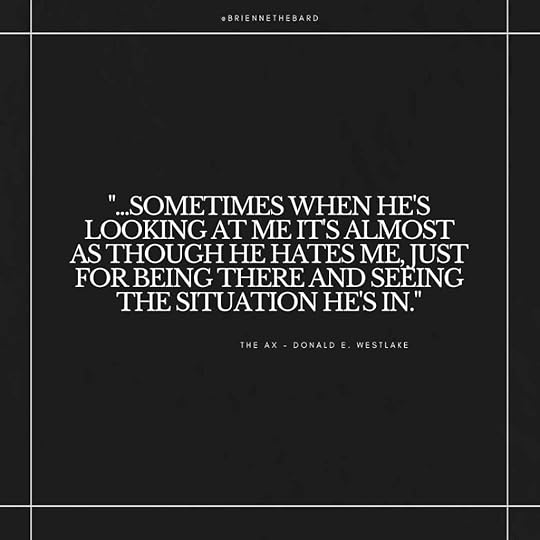
Following Burke’s story during this phase of his life results in two questions. 1. Will Burke get away with this? and 2. Can Burke be made to understand what he’s doing is wrong and change the way he accepts his situation? The second question is obviously much more difficult because to accomplish it would require Burke to seriously examine himself and let go of many toxic ideas.
That’s why his marriage counseling visits become such an interesting part of the novel. Several times throughout the book it feels like Burke has almost reached the enlightenment he needs. I admit to frustratedly turning pages waiting for his therapist to dig just a tiny bit deeper.
That’s part of the point though. Examining why you feel the way you do and understanding your reactions to situations is essential to the functions of life. The theme of evolution is woven throughout the story with the idea being that while yes, we’ve come so far in many ways (technology) yet we remain so ignorant in others (getting rid of workers in the prime of their lives). How evolved can we be if we’re beholden to our impulses? Have we really made it that much farther than cave men if we react without reason?
While there wasn’t a pithy phrase for it at the time of publication another of this book’s majors themes is toxic masculinity. It’s a fascinating insight into the mind of a man who cannot separate his identity from his career. Burke is the job. The job is Burke.
By the end of the book I was asking myself if we, society, share some responsibilities in tragedies like this. Burke made the choices he made, but is there a deeper conversation around work and identity? What expectations do we have of our workers? Our men? Who do we reward and what are we rewarding them for?
After all, Burke eventually got his dream job.
June 16, 2024
Book Review: The Ax by Donald E. Westlake
This is a spoiler-free book review. Check back for my full (spoilers included) book report on The Ax.
“There’s nothing out there but me and the competition and I have to beat the competition. I have to. Whatever it takes.”
I’ve recently discovered a gift that I was unaware I possessed. Apparently I have the “touch” when it comes to discovering good books. And I mean that literally. Our local library’s catalog system is a little clunky so I usually don’t go searching for specific books. I have developed a habit of running my fingers along the spines in the fiction section until one just feels right. I check out the cover and the synopsis and somehow, so far, they have all been winners.
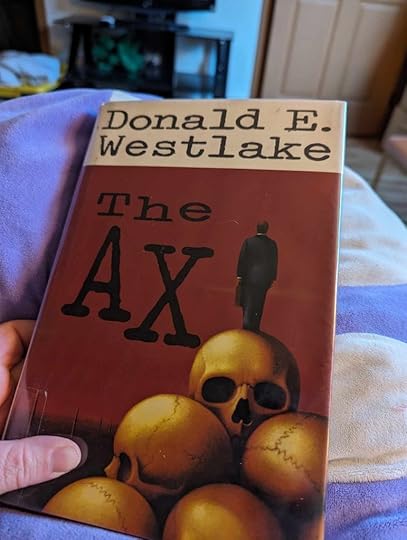
Enter: The Ax by Donald E. Westlake. This mystery/crime thriller shares the story of Burke Devore, an out of work paper industry middle manager with a deeply twisted secret. The story, which takes place during the 90s technology boom has many implications for our current outlook with regard to AI. Put simply – Burke is tired of job hunting and is prepared to take his search to the next step.
One of the highlights of this book that really worked for me was Devore’s casual relationship with the reader. Westlake makes you feel like you’re sitting at one of the diners Burke likes to frequent simply listening to him tell you his story over a cup of coffee. This technique really works to make you trust him early on in the narrative and see him how he sees himself: as a simple, out of work line manager. Slowly we learn how unreliable Burke is as narrator of his own story and that’s just good ‘ole fashioned fun right there!
What didn’t work for me? For starters, I’d hesitate to call this a mystery even though that’s how it’s classified in some cases. There’s not much mystery to this mystery, but there is a lot of deeper meaning. I love a nice short chapter (something about the feeling of progressing through the book, I dunno), but there were chapters throughout the middle that felt a little slow. A lot of information is provided on minute details of the ins and outs of the paper industry and while that works for Burke’s character (he IS his job) it’s not always the most exciting.
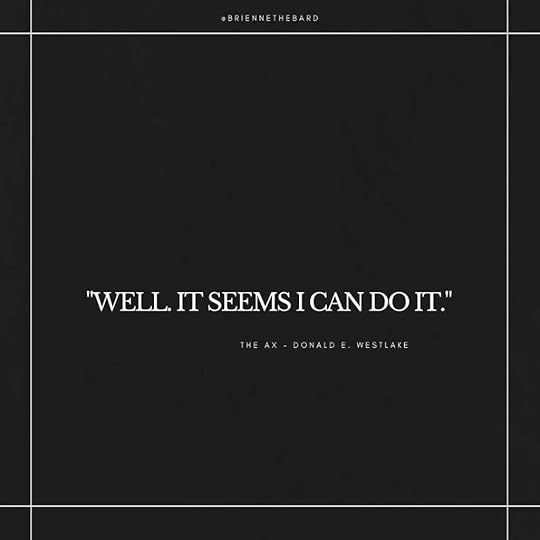
Overall I’d give this book 3/5 stars. It was a good, mostly entertaining read and really makes you stop and ponder some tough questions about how we see our jobs and how our jobs see us.
June 11, 2024
AITA? Being a Constructive Member of a Writer’s Group
A ritual I’ve adopted since reigniting my writing journey is attending a monthly peer critique workshop for writers to give and receive feedback on each other’s work. Roughly two weeks before our meeting interested participants are encouraged to send in a piece of work for everyone else’s review and when we show up we share our thoughts. That last part, however, is always preceded by a reading of the group guidelines for how to give (and receive!) feedback.
Who needs to have the feedback process explained to them? It’s not that hard to simply avoid being an asshole, right? There’s actually more to it than that. Included here are the guidelines our group tries to follow (we’re not perfect) as well as a few of my own opinions on how to run and participate in a writer’s group that runs like a well-oiled machine.

On Giving Feedback
Adopt a Reader’s POV: I’m reading this person’s work, how could I not be adopting a reader’s POV? I hear you, but what I mean is that when you share your feedback it should sound like it’s coming from a reader, not a fellow writer. For example, instead of saying, “You should have Mr. Green find the candlestick in the ballroom as a prelude to the rising action,” you could say, “I found Mr. Green’s lack of clues frustrating as I was trying to solve the mystery for myself.” See how one of those sounds like a suggestion and the other is just a reaction?
Let me also provide the caveat that this will not work for every style of writer’s group. Some groups are created specifically for writers seeking writerly advice and that’s okay. I find it helpful, however, to hear a reader’s perspective without another writer’s baggage included. What it tells me is that something I wrote or the way I wrote it isn’t working and then I get to be the one who decides if and how I address that. Sometimes hearing another writer’s suggestion stops you from pursuing what could have been your more unique solution.
Nitpicking is No Fun: Here’s a little story about a silly college student who decided to shop online in class while her playwriting professor was hosting a feedback group. She was called out (rightly so) by another student for not paying attention and returned to her dorm red-faced. (It’s me, I’m the asshole.) But why, you ask, were you so easily distracted during a session of something you had great passion for? Instead of discussing big picture items like plot, story arc, protagonist traits, etc., we were dissecting each other’s grammar line by line. This is not a helpful exercise (sorry, professor!) and can have the effect of boring your group to tears.
Unless the grammar in a piece makes it unintelligible this isn’t typically a helpful place to focus all of your feedback. Noticing a glaring error in the title is not a big deal, but comma-policing an entire chapter of a book is fun for no one. There are plenty of apps and AI-centered programs ready to red-pen the crap out of your manuscript. So instead of picking nits simply say, “You may want to take a look at some of the grammar,” and just move on.
Editing Another’s Work: Just. Don’t. Be. That. Guy. Seriously. This one is a particular pet peeve of mine, but I recognize that those just starting with their group experiences may not be aware of the etiquette around these subjects. It’s never okay to edit someone’s work without an agreement with that person. Ever. Even if you’re like the last asshole (me) and your focus is just grammar, not story it is still not okay. You don’t know what the writer’s intentions were and therefore even if you think you’re being helpful please avoid this at all costs. It will undoubtedly annoy the other members of your group.
Just Shoot for 1/1: One of the more difficult things about providing feedback is coming up with something to say that you feel might be useful to the writer. This can be especially daunting if you’re new to a group. You may feel intimidated by other members’ great suggestions or feel that you aren’t well-versed enough to make any. I recommend shooting for one thing you enjoyed and one thing you found difficult/confusing. As I read the work of my peers I tend to take notes and I like to simply bullet items like “loved X,” and “didn’t understand Y.” If you can come up with more than that, do! It’s always helpful to have more than one possible piece of feedback written down in case someone else shares yours, but letting a writer know one thing they’re doing well and one thing they could work on is always a great start.
On Receiving Feedback
Just Say Thank You: This is a biggie because we writer-folk are a sensitive bunch. And why shouldn’t we be? These are our babies, our little darlings that we’ve poured so much effort, love, and care into. So it’s easy to understand why we get defensive when someone misunderstands, or worse, DISLIKES our work.
Let me paint you a picture: You’ve written a brilliant piece about an incredibly out-of-touch person as they walk through life. They keep falling into worse and worse situations because of the attitudes they hold about groups of people. The theme, the essence of your masterpiece is all about how when we judge others we are only hurting ourselves. Brilliant! (I’d read it.) But someone in your workshop just does not get it. They tell you they found your protagonist unlikeable and hated that he was just allowed to say whatever he wanted. What’s the point of creating such a nasty, hateful character they ask?
This is the pivotal moment. This is when you bite your tongue. Instead of explaining, “Oh – no, no, no! See, he’s a jerk on purpose! The underlying message is-,” No! Every time you think of doing this imagine me bapping you on the head like a cat. Defending (and even explaining) your work benefits no one. It’s a detriment to both you and the person providing feedback. Next time the reader will be reticent to provide you with feedback because they don’t feel like they’re being taken seriously. But perhaps even more importantly you will not understand the confusion and potential problems with your story by jumping to its defense. Sit with the feedback, and roll it around in your mind, could you have done a better job of making your theme clearer? Only you know the answer to that. The great thing is if you decide the other person is full of shit you can toss that feedback right into the mental trashcan and not use any of it.
Limit Info Given: This one is mostly a personal preference and there’s nothing wrong with feeling differently, but I find it most helpful to keep the information that I provide to the reader as minimal as possible. I recently heard someone say, “I need to know what genre a piece is meant to fit into so I know how to provide feedback.” I don’t think this is true. This could be helpful if you’re participating specifically in a writer’s group where the goal is “writerly feedback.”
However, I learned early on during my attendance in my group that it didn’t benefit me to over-explain any part of my work. I want to see if it stands on its own. One of the first works I submitted was a chapter of my horror novel, Fat Phobia. I’d seen another horror offer writer, “A Horror Novel,” under the title on their manuscript and thought, yeah, I’ll do that! What happened? It completely prepared everyone for what they were about to read. They were prepped to read a spooky story and therefore went into it with certain expectations. I wanted to know if they were spooked by my novel without expecting it to be spooky. So when possible I now stick to my name, my title, and relevant contact info. That’s pretty much it.
Writers groups can be a real benefit whether you’re just starting out or are a seasoned author. It never hurts to get a fresh perspective and it shouldn’t! We always need to keep in mind that the goal is to keep people writing and that means creating safe spaces for writers to be vulnerable, share uncomfortable work, and receive compassionate, helpful feedback. What other tips would you recommend?
June 4, 2024
The Importance of Getting It
It’s not an accident that I gravitated toward a life dream that’s often associated with solitude. Certainly not a coincidence that 95% of the work of writing can be done alone in an office. And if I’m honest with myself I do try to keep it that way, preferring the click clack of my keyboard to the sound of another’s suggestions.

However I can’t ignore the fact that having a writing community to commit to holds many benefits for me, the most important one being: it’s made me better. I attend a monthly writer’s peer critique workshop and have done so for probably a year and a half or so now. Don’t get me wrong, sometimes the feedback isn’t all that helpful, but the amazing thing is that I’ve learned something new every. single. time.
Sometimes the right person shows up and makes a comment about my short story that I never would have thought about prompting me to make an important edit. Sometimes they do that for another writer and I learn by proxy how I can improve my own writing. Sometimes I learn new vocabulary words to describe the mechanics of writing so that my future feedback will improve. No times have I learned nothing.
Perhaps even more surprising, for me personally, than how much I’ve learned is how many true friends I’ve made. These are good, supportive friends who understand the hard work of writing and the challenging, emotional processes of submitting your work. They buy your latest book, they tell their friends about you, offer to read your work, lend you their skills, all because they get it.
Now there’s a local group I’m excited to start meeting up with in addition to the one I attend online every month. This past weekend I attended my first writer’s conference and learned so much from the speakers as well as the other attendees. Do I still enjoy the calm solitude that comes from sitting down at my keyboard with fresh ideas in my head? Of course. But there’s just something to be said for being a part of a community who just gets it.
May 21, 2024
Book Review: One of us Knows
Many of the bibliophiles I know like to plan their reading. Sometimes that means a month at a time, sometimes it means for the entire year, but always it’s a carefully curated selection of titles they are excited to embark on. One of my favorite things happens to be planning out my reading list and having it promptly derailed by something wonderful. That’s what happened with Alyssa Cole’s, One of us Knows.
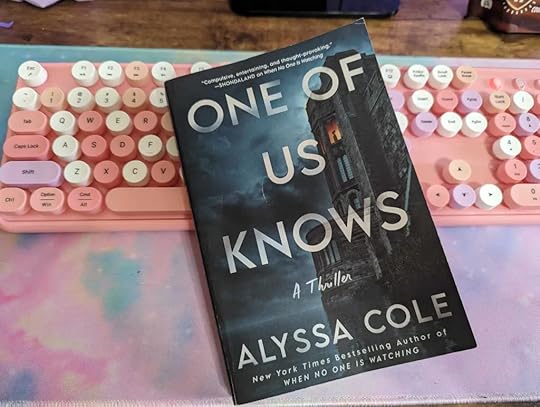
My 2024 reading list included an eclectic range of books spanning several genres and including some I should read in school but didn’t. The bulk of it, however, relied on horror titles because that’s generally my bread and butter. On that list was Cole’s first book that I was excited to read, When No One is Watching. I won’t veer far off into talking about that one except to say that it. was. awesome.
The thing is, I had plans. I had other books to come after and then I learned that just as I finished When No One is Watching the author released a brand new book. What can I say? After reading the synopsis I had to see what else she had in store for me and boy was I not disappointed!
It’s difficult to capture all this book has to offer without giving too much away because there is simply SO much here. One of us Knows is the story of Kenetria Nash, a woman living with DID (dissociative identity disorder) and each chapter is told from the point of view of one of the “headmates” in her mental system, each one having their own personality traits, unique advantages, medical concerns and fears.
We “wake up” with Ken on a dock awaiting a ferry to take her to her new job as a castle caretaker on a mostly deserted island, learning that she has been dormant inside her own mind for six years. We are along for the ride as she pieces together her own life as well as the world events she’s missed. (Imagine waking up mid-pandemic!) From there we join her on her journey to discover why she’s here, what her headmates have been up to and what exactly is up with creepy Kavanaugh Island.
This book is FILLED with mysterious intrigue, brilliant insights into mental health, illuminating commentary on current social issues regarding race, gender and religion as well as hilarious and emotionally moving dialogue between headmates. Sure, there’s a super fun mystery here about the history of this castle and the secretive trust that owns it today. But it’s more than that. As I’m quickly learning is Cole’s typical style, this story is also a deep look at how we treat ourselves and help ourselves heal and understand our own trauma.
Highly recommend – 5/5 stars
May 14, 2024
Book Review: The Auctioneer
Rarely do I get to enjoy the feeling of reading something that feels like a hidden gem. Book marketing is a huuuuuge business so by the time I know about it, so does everyone else. That doesn’t say anything about the book’s merit, but it definitely feels cool to be able to introduce people to a book they may have been sleeping on. That’s where The Auctioneer, by Joan Samson, comes in.
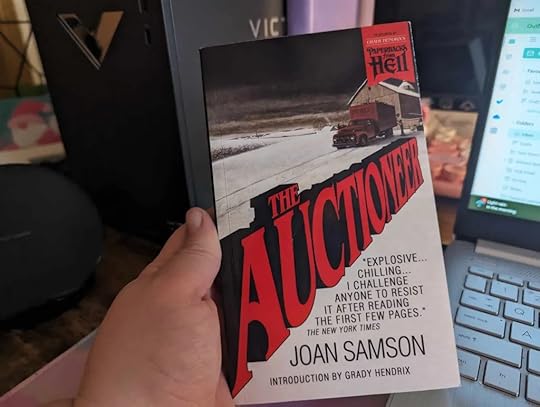
The Auctioneer’s vibe could best be described as creeping discomfort. Published in 1976 as Samson’s sole work it’s a book that can go easily unrecognized on top lists, but it shouldn’t. In fact, its central idea of a charismatic man showing up one day to take advantage of folks living in rural America is probably more relevant now than ever.
What happens to this small town’s inhabitants could happen to anyone. Maybe it could happen to you. It’s a cautionary tale of what happens when you ignore red flags, go against your gut and become afraid to stand alone. At first the auctions are proposed as a way to get rid of people’s household junk and fund the fire department. Then a series of unprecedented crimes begin to take place, prompting a need to fund a continually growing police force. Strange things occur as neighbors growing increasingly wary about talking to one another.
The auctions continue, becoming less and less voluntary, and before the townspeople know it there are items being auctioned off that no one was prepared for. Samson explores themes about how we choose who we put our trust in and what we are capable of when we have nothing left to lose. The ending will make for some very interesting book group discussions as there are multiple ways to interpret the ultimate choices that the townspeople make.
You definitely begin the book thinking to yourself, “I’d never fall for something like this,” but I’d challenge you to dig into its meat and not see yourself reflected in these characters who may be too trusting, too polite, too unsure, too afraid. What would you allow someone to get away with?
April 22, 2024
Book Review: A Creature Wanting Form
You ever read a book that truly makes you stop and examine the world around you? Luke O’Neil’s, A Creature Wanting Form, really did that for me. This was my first short-story anthology this year and it didn’t disappoint.
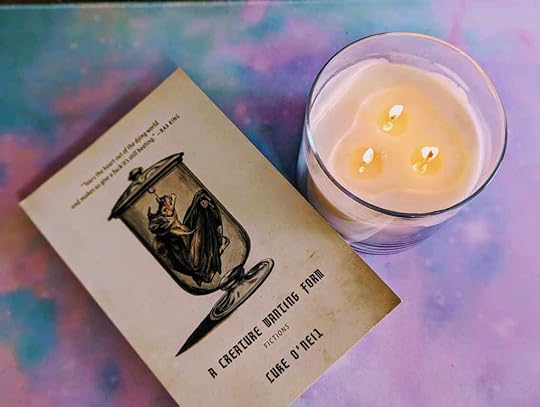
You could say the theme is apocalypse – both pre and post end of the world events. I’ll get this out of the way right up front: not every story in the book landed for me. The good news is there are more stories that did leave me emotionally gut-punched than not.
What can you expect? Climate change disasters, creeping fears about police, strange animal behavior, an inability to connect with others and the drifting out to sea lonesome feeling rotting out your gut. This book does a great job of describing what it’s like to exist as a grownup in 2024.
My biggest critique is that the stylized language/grammar can make the reading a challenge. O’Neil opts for long sentences with little in the way of punctuation. While this does give the impression of someone sitting next to you at the kitchen table telling you all their horror stories, it can make the act of reading the book a little cumbersome.
Despite that though, this is a book worth reading, especially if you find yourself looking around and asking, “Is anybody else seeing this shit?”



